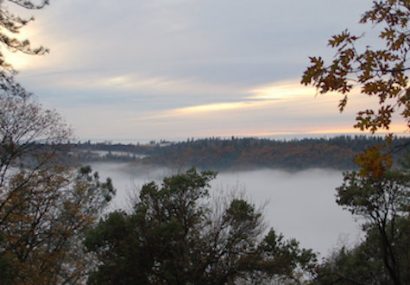The Colorado Supreme Court has ruled that an inverse condemnation claim regarding shares in a mutual ditch company was not an exclusive water matter, and therefore not within the jurisdiction of Colorado’s Water Courts. This decision was the most recent in a line of case law that has attempted to clarify the often-murky definition of a “water matter” under Colorado law. [Allen v. State of Colorado, 2019 CO 6 (Colo. 2019).]
Background and Water Court Decision
The subject case, Allen v. State of Colorado, began as an inverse condemnation claim. As background, Mesa County Land Conservancy, Inc. (Mesa) acquired a conservation easement over a 140-acre ranch, water rights, and nine shares of Big Creek Reservoir Company stock. As part of that conservation easement, Mesa secured a covenant that “[a]ll water rights held at the date of conveyance shall remain with the land.” The plaintiff, Sam Allen, later purchased the ranch, including the accompanying water rights and ditch company shares.
Sometime after that purchase, Mr. Allen again sold the ranch, but this time only included the water rights, not the ditch company shares. Mesa then filed a declaratory judgment action against Allen, alleging that he had violated the specific conservation easement terms that that the water rights must stay with the land. Mesa was granted a permanent injunction in the District Court, and that judgment was later affirmed by the Colorado Court of Appeals. Mesa Couny Land Conservancy, Inc. v. Allen, 318 P.3d 46 (Colo.App. 2012). Allen then further appealed to the Colorado Supreme Court, claiming that the conservation easement only applied to the decreed water rights, not the ditch company shares. Allen’s petition for a writ of certiorari was denied, leading him to file the present case in Water Court, alleging that the permanent injunction was tantamount to a judicial taking of his ditch company shares.
The defendants in that case, including Mesa and the State of Colorado, moved for a dismissal under C.R.C.P. 12(b)(1) and 12(b)(5) for lack of subject matter jurisdiction. The Water Court granted the dismissal, holding that, because the dispute was grounded in ownership of water, not use of water, Allen’s claims were an action more appropriate for the District Court. Allen then appealed—in Colorado, Water Court appeals go straight to the Supreme Court, leading to this current case.
Water Court vs. District Court Jurisdiction in Colorado
Under Colorado law, the Water Courts have exclusive jurisdiction over “water matters.” C.R.S. § 37-92-203(1). Unfortunately, the Colorado Legislature’s definition of water matters— “only those matters which [C.R.S. article 92] and any other law shall specify to be heard by the water judge of the District Courts”—is sufficiently vague to give rise to an intricate body of case law. Id.
The closest approximation to a bright line rule comes from Humphrey v. Sw. Dev. Co., in which the Supreme Court explained that the:
- . . .[r]esolution of what constitutes a water matter turns on the distinction between the legal right to useof water (acquired by appropriation), and the ownership, of a water right. 734 P.2d 637, 640 (Colo. 1987).
The past 30 years of case law has shown that “use” includes, but is not limited to, applications for decrees, changes, abandonment, and adverse possession. See, S. Ute Indian Tribe v. King Consol. Ditch Co., 250 P.3d 1226, 1234 (Colo. 2011). Conversely, the “water matters” jurisdiction of the Water Courts does not extend to quiet title, instruments of grant or conveyance, and other similarly situated real estate matters. Kobobel v. Colo. Dep’t of Nat. Res., 249 P.3d 1127, 1132 (Colo. 2011).
The Colorado Supreme Court’s Decision
A simple reading of the above cases might seem to make clear that Allen’s claims are not water claims but rather an issue concerning the conservation easement and therefore a matter for the state District Court. However, Allen claimed that the question of ownership is not at issue, because the previous case resulting in a permanent injunction had satisfied any questions of ownership of the ditch company shares. Instead Allen argued that, because he was forced to transfer the shares against his will, his right to useof that water was taken without just compensation.
Analysis under the KobobelDecision
To make that argument, Allen relied chiefly on Kobobel, in which the plaintiff was able to bring an inverse condemnation action in Water Court after the State Engineer’s Office ordered him to cease and desist the use of several of his wells. 249 P.2d at 1130-31.
The Supreme Court fully rejected that claim, principally basing its argument on the fact that, contrary to Allen’s assertions, the rights at issue in this case were his ditch shares, not any right to use that water. In Kobobel, the ownership of the wells was not questioned; the case was only about if plaintiff had a right to use the water. Here, the Supreme Court said, the distinguishing issue is the ownership of the water right (vis-à-vis ownership in the ditch company). This argument is further supported by C.R.S. § 7-42-104(4) which defines ditch company stock as “personal property and transferable as such in the manner provided by the bylaws.” With that definition, it is clear that the ditch company shares are much more akin to a real estate instrument than a specific right to usewater.
The court also noted that, although Allen’s claims could have an incidental impact on the use of that water (i.e., he could not use it if he didn’t own it), that fact was not enough to give the Water Court jurisdiction over the inverse condemnation action. See, Bijou Irr. Dist. v. Empire Club, 804 P.2d 175, 180 (Colo. 1991).
Conclusion and Implications
Although this case may seem rather straightforward in hindsight, it exists as a good example of the lack of clarity parties face in Colorado when deciding whether to bring a claim in Water Court or District Court. Because of procedural differences in Water Court, including the direct appeal to the Supreme Court, Colorado has been understandably protective and has sustained a rather restrictive view of what constitutes a “water matter.” With its latest decision in Allen v. State of Colorado, the court has doubled down, and hopefully offered a bit more clarity, on its distinction between questions of ownership and question of use. The Supreme Court’s decision is available online at: https://www.courts.state.co.us/Courts/Supreme_Court/Case_Announcements/Files/2019/B6E4921.22.19.pdf
(John Sittler, Paul Noto)




